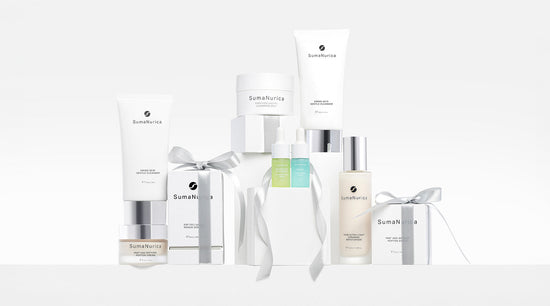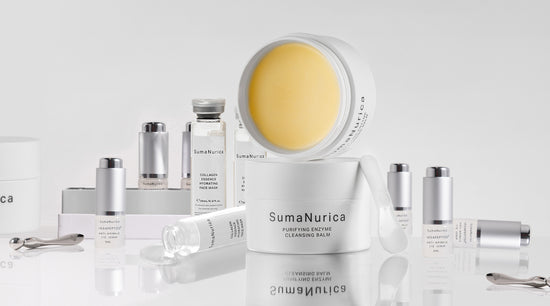What Causes Acne?
Acne can affect most of us at some stage throughout our lives, and in many cases, it can affect our self-confidence quite a lot. Much more research is required on this skin condition; however, we do understand the basics of its causes and management of symptoms.
If you're looking for skincare powered by science that is ideal for all skin types, including acne-prone skin, explore the full range of SumaNurica biotechnology products today. For unmatched hydration that is gentle on the skin, try the new Collagen Essence Hydrating Face Mask.
What is Acne?
Acne, scientifically known as Acne Vulgaris, is a common inflammatory skin condition that appears as lesions on the skin's surface that can vary in size and colour from small, red bumps to whiteheads (commonly known as pimples) to large, painful lumps under the skin's surface also known as cystic acne.
Acne results from our pores becoming clogged and preventing sebum (oil produced by sebaceous glands) from reaching the skin's surface. This causes a mix of oil, skin cells, and bacteria to grow in the plugged follicle and cause inflammation on the skin.2
Most people will experience acne during their teenage years; however, acne in women is also common into adulthood.
Causes of Acne
The three main factors that result in acne – excess oil production, the buildup of dead skin cells in pores, and bacteria growth in pores3 – can have a range of causes.
Hormone imbalances that cause the pores to produce too much excess sebum are usually the leading cause of acne. This is why most people experience acne when going through periods of hormonal change, such as puberty. However, persisting hormonal imbalances can result in acne during adulthood, including from conditions such as polycystic ovarian syndrome (PCOS) in women or excess androgens (male sex hormones), which various factors can cause. We recommend consulting a doctor to help you determine whether you may have any hormone imbalances.
Will chocolate or dairy give me acne? No – while having a healthy, balanced diet is vital for optimal health, there are few studies linking chocolate or dairy consumption directly to causing acne. More research in this area is still needed; however, some studies show links between certain foods and the worsening of acne symptoms. A balanced diet of whole foods and limited highly processed foods, sugars, and alcohol is always a good place to start!
Other factors such as certain medications, stress, lack of sleep, smoking, and genetics can also play a role in the development of acne; however, everyone may be different, so we always recommend working with a doctor or dermatologist to determine what may be causing your acne issues.
How to Prevent Acne
A healthy, balanced lifestyle is ideal for optimal skin health. It can put you in the best position to fight off any potential acne infections, minimising your body's inflammatory response to blocked pores.
Follow a consistent skincare routine: use a cleanser and moisturiser twice daily to ensure your skin stays clean and hydrated. But be sure to be gentle! Using overly abrasive products with drying or stripping ingredients may worsen symptoms by causing inflammation! So use non-harsh and anti-inflammatory ingredients and products that care for and hydrate the skin's surface – such as our Collagen Essence Hydrating Face Mask.
Use a salicylic acid-based cleanser, which will help to clear away any dead skin cells on the skin's surface, assisting with keeping pores clean and clear of unwanted cells and bacteria.
How to Get Rid of Acne
There are several ways to get rid of acne. Some people may benefit from topical creams, either over the counter or prescribed by a doctor; however, some require oral medication to clear up and prevent more severe cases of acne.
We recommend consulting your doctor and requesting a dermatologist referral to help you with this.
How to Get Rid of Acne Scars
Exfoliating and skin-renewing products can help to renew the skin's surface and help acne scars heal faster. Look for ingredients like salicylic acid, AHA's (or alpha-hydroxy acids), or products containing Vitamin C to satisfy the complexion. But be careful with any products that are too harsh! Some products must be used sparingly while your skin gets used to the new ingredients. Retinoid products such as retinol may also help encourage cell renewal, promoting faster healing of scars.
Maintaining the skin's protective barrier and hydration levels is also essential in helping the skin to renew and heal itself. We'd recommend regular use of our Collagen Essence Hydrating Face Mask to maximise your skin's hydrating levels and to help promote a healthy, even complexion.
Experience The New Era Of Skin
Loved learning about the world of skincare? Find more articles like this one in our learning center here.
Want to start your SumaNurica skincare journey? Shop our Collagen Essence Hydrating Face Mask here, or shop the entire SumaNurica range here.
Question not answered? Or want to speak to one of our friendly skincare experts? Head to our live chat in the bottom right corner and a skin specialist will be there to assist with all your skincare questions and concerns.







